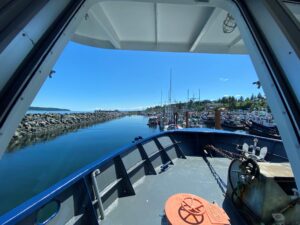For almost every seafarer, there is a common goal- gaining the experience, courses and sea time needed to eventually move up the ladder and earn the esteemed title, Captain. You will notice that on this coast, we are fortunate to have Captains with a variety of backgrounds and skills. Many of them have started in this industry as teenagers, spurred on by their parents who perhaps wished for their children to follow in their footsteps. As with anything in life, so many of our lessons are learnt by others who pass their wisdom down to us.
I had the privilege recently, to speak with three Captains from the British Columbia coast- all with varying backgrounds and many years on the sea. Here is an insight into their transition and experiences from a deckhand to the Captain position they each now hold.
Before coming to Western Maritime Institute to study for his Master 150GT, Captain Nicholas J. worked as a deckhand on tug boats. He had developed a passion for tug boats towing logs and barges, and a curiosity for other areas of the marine world as a whole. Knowing that his future would be as a Captain, it was important to Nicholas to ensure he experienced various parts of the Marine Industry- this philosophy has and will continue to lead him to experiencing all that the marine world can offer.

Pictured above, looking from the bridge of the ‘Ocean Marauder’ into the Campbell River Harbour.
What made you want to transition from being on deck to getting your Captains ticket?
“One of the most attractive incentives of the marine industry is the natural progression for one’s career. Once you feel you have achieved the correct understanding of the job that you are doing, the next step in your career ladder would be to begin working towards earning your ticket as a Captain. With this, comes an increase in responsibility (and pay) however, it is accompanied by administrative and operational responsibilities also. You want to succeed and be the best at what you want to do and therefore that means continuing to move up the ladder.”
Can you give insight into how life as a Captain (or at sea) has affected life at home?
“When it comes to the scheduling, nothing changes from deckhand to Captain. By the time you get your ticket, you’ve become accustomed to the time away and general challenges of being at sea. You do bring the stress home- to an extent. The boat becomes your life and therefore it does come home but not necessarily in a negative way. You have friends in the industry, and they understand the lifestyle and challenges it may bring which in turn means you can bounce your thoughts and ideas off one another. It is a lifestyle just as much as it is a career.”
What has been the highlight to your career so far?
“The highlight was the first day (as Captain), on my own boat with my own deckhand. By the time someone applies to Captain their own vessel, they have looked at this position for years and suddenly, you are signing your name on a log as Master. It is a surreal feeling- for me, my first shift as Captain was a nightshift. I want to mention the hiccups- the first few times that something doesn’t go the way you wanted or expected it to. It doesn’t mean a dangerous situation more so a, “I won’t do that again” situation- and that is how you learn.”
Where do you see yourself in the next 5 years, professionally?
“In 5 years, I’ll still be running a boat, my own boat. I’ve always had a passion for long range coastal towing and years from now, that’s exactly where I want to be. Obviously I may look to gain more certifications but ultimately, I’ll still be on the coast.”
Any advice to upcoming Captains?
“Take it slow and seek all the training you can get. Find some good mentors that are doing what you want to do and learn as much as you can before you become a Captain because when you become a Captain, your crew will be looking to you for their own training. All of your memories and lessons learnt on the water (as a deckhand) will be what you take into your position as a Captain. It’s all about spreading and sharing the knowledge and if you have a question, ask!”
Final comments:
“The biggest piece of advice is to carefully use your time decking, make the most of your time! Make a log, make notes, remember everything- there is a noticeable difference between the sailors who paid attention and those who weren’t as invested. Once you’re a Captain, you get thrown in the hot seat and you get to figure it out by yourself.”


